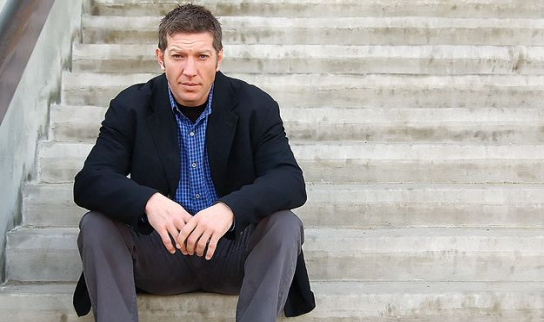Print Edition: March 6, 2013
If you had been abused by a relative, a teacher, a stranger or a coach … would you speak out?
In a world which tends to stigmatize the victim along with the perpetrator, the answer to this question is often “no.” It’s often too hard, too painful, too risky or too vulnerable for individuals to admit they’ve been violated, even if their courage could save other young people from a similar fate.
Sheldon Kennedy knows first-hand how difficult it is to admit to being abused. As a former NHL player he understands how little the sports world wants to discuss such abuses, or even admit they exist.
Kennedy was at UFV last Wednesday on Pink Shirt Day as part of the President’s Leadership Lecture Series. He discussed his role in bringing his former coach, Graham James, to justice for abusing dozens of his players including Kennedy himself, and the role he has taken to bring attention and prevention to sexual abuse, bullying and domestic violence.
Speaking on a number of issues, Kennedy addressed aspects both of his personal story and the programs and institutions he is helping to found. One of the most important questions asked of him was similar to the title of his 2006 book Why I Didn’t Say Anything. Kennedy answered the question, why he hadn’t spoken out sooner, with an eloquence that was obviously the result of a momentous personal journey.
“I was playing with the Calgary Flames at the time [when I decided to make the accusation],” Kennedy explained, “and my wife was pregnant with our daughter. I kept seeing Graham James outside our locker room because he was coaching the Calgary Hitmen at the time, and there were always these young guys hanging around him. So I thought, well if nobody else is going to do anything than I need to do something here … I knew if I didn’t do something then I would never be the dad or the person that I wanted to be.”
Kennedy was also careful to note that telling his story was only the beginning of his journey, rather than the end. While people often assume that accusing James somehow “solved” the issue, Kennedy explained that when victims finally speak out they are actually at their “most vulnerable.” He said, “I think we’ve learned to live to a certain way with the trauma that was inflicted on us as a kid … you take all of these feelings that are coming outside of the treasure box that you kept all your secrets in, and they’re coming out upside down, sideways and what else, and all you want to do is shove them back in there but you can’t get the lid closed. So now you got to deal with this stuff.”
One member of the audience asked Kennedy how he had managed to “deal” with his past, citing her own experience with abuse and her difficulty moving beyond it. Kennedy responded by saying that “for me it was taking the risk to trust again.” He explained that without trust it is impossible to recover from the trauma of abuse, and, while it’s extremely difficult, healing was about rediscovering how to trust those around him.
In the years since helping bring Jones to justice, Kennedy has embraced his role as an advocate, and even been awarded an honourary doctorate from UFV in 2012. Two days before his speech to the UFV audience, one of his projects, a child advocacy centre, opened in Calgary. This centre, combining child and family services, Alberta Health, a crown prosecutor’s office, and a police presence all under one roof, fulfilled a part of his vision to make dealing with abuse and violence an easier and simpler process.
Kennedy’s ultimate goal is to “empower the bystander” to have the judgment and knowledge necessary to recognize warning signs and report them. “Perpetrators and pedophiles operate on our ignorance and our indifference within our communities,” he explained.
In Kennedy’s eyes, all of us have the responsibility and the ability to protect the young and vulnerable around us.


